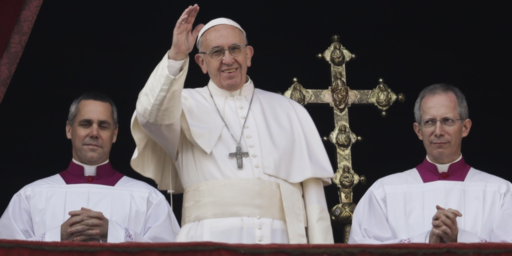John Roberts and the Catholic Question II
Ramesh Ponnuru responds at length to my post on Christopher Hitchens’ piece on John Roberts’ alleged statement that he would recuse himself from cases where the law and Catholic teaching are in conflict, making some fair points.
I fail to see the distinction in his first point, though:
I didn’t accuse Hitchens of “anti-Catholic bigotry.” I noted that Hitchens’s pre-emptive defense against the charge of anti-Catholic bigotry is that anti-Catholicism is justified by the sinister nature of the church.
Ponnuru’s exact words in the original post were, “Anti-Catholicism isn’t bigotry because it’s justified.” That sure sounds like a charge of anti-Catholic bigotry.
I don’t disagree with Ponnuru’s second point,
[Hitchens] has specific objections that he has outlined in detail. He seems to think the conduct of Cardinal Law is somehow relevant to John Roberts’s fitness to serve on the Supreme Court.
While I agree with Hitchens that the role of the Roman hierarchy in covering up the crimes of a not insubstantial minority of its priests was shameful, it does seem a non-sequitur in this context. But having specific objections to the actions or teachings of a group is rather the opposite of bigotry.
Finally,
Hitchens’s argument cannot be reduced to the view that papal bulls should have no place in a judge’s decisions–and we have no reason for thinking that Roberts disagrees with that view anyway. Jonathan Turley’s third-hand and vague description of a conversation that the principals deny having had does not constitute a reason.
The context of my analysis was the presumption that Turley’s account was largely correct. I allowed that I was dubious that Roberts would have said what was alleged but that Turley seems a reputable enough fellow. If Roberts indeed said that he would recuse himself in cases where the rulings of his Church contradicted his duties as a judge, however, I find it problematic.
Hitchens’s argument is that the Roman Catholic Church, alone among the faiths from which a president might reasonably appoint a Supreme Court Justice, has essentially said that its members who go against Church teachings in the course of the official course of their duties are to be damned to hell.
Being Catholic is not inconsistent with doing ones judicial duties–Scalia, Thomas, and Kennedy have not had to recuse themselves so far as I’m aware–or serving in political life generally. If a person is unable to reconcile himself to putting the law above his religious faith when the two are in conflict, however, then he is unfit to be a judge. Many of the most controversial issues of our time are decided by margins as slim as 5-4. Having a Justice recuse himself whenever those cases arise would be outrageous.
Perhaps Ann Althouse is correct that Roberts is saying nothing different than what Scalia has said on the subject. One certainly hopes so. Certainly, there has been no reason to think him unfit for the Court up until now. The plain meaning of his comments as recorded by Turley, however, suggest something different.





James–Good for you for striking the right balance between Hitchens’ harangue and the right’s cries of Catholic-baiting. Any beliefs–philosophical, religious–that have a direct bearing on how a nominee interprets the law do indeed bear elucidation. Be careful, though, let you be named a Catholic-baiter yourself. That’s what happened to me when I wrote that, a), it was a shrewd move for Bush to nominate a Catholic, since any scrutiny of his position on abortion would be deemed “anti-Catholic bigotry” by the right and, b), that the nomination of Roberts must have Rome smiling. Great blog ya got here.
However, that “plain meaning” as recorded by Turley has been contradicted in subsequent article and discussion. Certainly the memos recently released show that Judge Roberts rather scrupulously stuck to serving the law and subordinate personal beliefs and the desire of the Executive to precedents and acts of Congress. See for example the discussion here. Also see Professor Bainbridge’s discussion of the subject.
The topic has been well-discussed before. The short version is that there are only an extremely limited number of ways that a ruling could be considered active cooperation with evil, many if not most of which require fairly creative hypotheticals. (The only one that does not require a creative hypothetical concerns sentencing criminals to death. Appellate review is far less controversial. Of course, liberal judges on the Supreme Court (since retired) have issued opinions on capital punishment that seem fairly close to nothing but personal opinion, so it is understandable how people could be concerned that private views would influence that of the law.)
Judge Roberts appears to suffer from a common flaw in an intellectual, especially a legal type. He appears to have taken an hypothetical too seriously, and made a statement based on extreme cases.
It also occurs to me that the question seems similar to asking a soldier or a police officer what they would do if faced with orders that deeply violated their morality.
If a person is unable to reconcile himself to putting the law above his religious faith when the two are in conflict, however, then he is unfit to be a judge.
It seems to me that a law that conflicts with ones faith should not be the law in the first place. Am I missing something here?
Nick: Yes. That it’s not a judge’s job to impose his spiritual views on the legal system.
Frankly, lots of things are legal and in violation of even mainstream religion in America. So what?
Reread Ramesh Ponnuru’s line. He’s not accusing Hitchens of anything. He’s summarizing what he believes Hitchens’ argument to be.
Having said that, Hitchens uses Roberts’ alleged declaration that he’d recuse himself as a convenient pretext to bash the Catholic Church. It’s as tired as Nast and as dull as the Know-Nothings.
Instead of everyone arguing whether or not the Catholic Church will “damn to hell” any Catholic that defies her edicts, why don’t we turn to the source? Among other things, this doctrinal note states:
Hitchenson’s dog won’t hunt. Neither will the other Anti-Catholics and Roe v. Wade pocket men’s toothless hounds.
Doh!
I said “Hitchenson’s dog won’t hunt” in my previous post. I meant to say, “Hitchens'”.
Thanks for all the attention! I’ve probably written enough on this topic on the Corner, so let me just say that I don’t think we have many remaining disagreements. What’s left is a dispute about the meaning of my line “Anti-Catholicism isn’t bigotry because it’s justified.” As the holy fool above noted, that was my characterization of Hitchens’s argument. You have a different reading of it. Whoever’s right about whether that’s a reasonable reading, I have made it pretty clear that I did not intend that meaning. So I think that’s that. (We would have a nontrivial disagreement if you endorse the view, which you attribute to Hitchens, “that the Roman Catholic Church, alone among the faiths from which a president might reasonably appoint a Supreme Court Justice, has essentially said that its members who go against Church teachings in the course of the official course of their duties are to be damned to hell.” Even then the extent of our disagreement would depend on the meaning of the phrase “go against Church teachings” in the “course of their duties.”)
I disagree in this context. If I say that I won’t confirm a black justice because I find Jesse Jackson’s conduct shameful, I’m engaged in bigotry – the belief that I can tell something about person x because of the conduct of person y.
I guess you could argue that (1) membership in the Catholic Church is voluntary; and (2) the Church is so inherently offensive an organization that remaining a member displays a callous disregard for basic moral values, and that therefore being a member of the Church is like being a member of Klan or something. But #2 is a sufficiently strong and controversial premise that at the very least, you should spell it out explicitly.
Just saying “John Roberts is a Catholic, and look at these bad things other Catholics have done, so don’t confirm him” looks a lot like bigotry.
J: Yes, if that’s what Hitchens’ argument was.
He’s saying that:
#1. The Catholic Church says A, B, and C
#2. The Constitution or U.S. Law says D, E, and F
#3. Roberts says he will not rule on any cases where #1 and #2 conflict.
He’s saying both, as I see it.